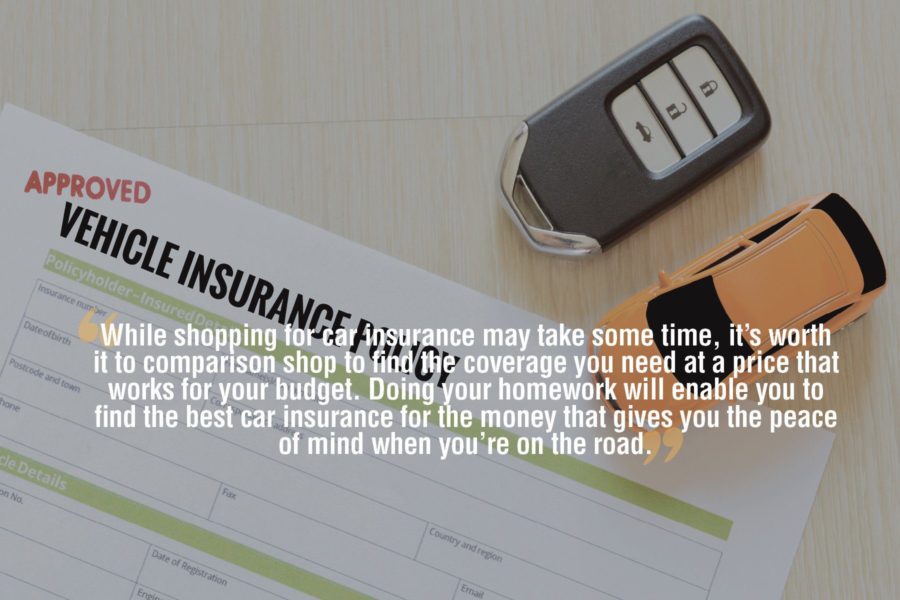Shopping for auto insurance is not something most people get excited about. However, it’s important to take the time to do your research to find the best plan to fit your needs and budget.
Defining Auto Insurance
First of all, what is auto insurance? Auto insurance is also referred to as car insurance, regardless of the type of vehicle you own. Car insurance is essentially a contract between you and an insurance company that protects you against financial loss in the event of an accident or theft. Car insurance provides coverage for:
- Property, such as damage to or theft of your vehicle.
- Liability, which is your legal responsibility to others for bodily injury or property damage.
- Medical, which is the cost of treating injuries, rehabilitation and, in some cases, lost wages and funeral expenses.
In exchange for your premium, which is what you pay the insurance company each month for the policy, the insurance company agrees to pay for your losses as outlined in the policy. Policies are generally issued for six-month and one-year time frames, and the company will send a notice when it’s time to renew the policy.
Am I required to carry car insurance?
Nearly every state requires auto owners to carry insurance for their vehicle, though requirements vary. Most states require you have coverage for:
- Bodily injury liability, which covers costs associated with injuries or death that you or another driver causes while driving your car.
- Property damage liability, which reimburses others for damage that you or another driver operating your car causes to another vehicle or other property, such as a fence, building or utility pole.
In addition, many states require that you carry:
- Medical payments or personal injury protection (PIP), which provides reimbursement for medical expenses for injuries to you or your passengers. It can also cover lost wages and other related expenses and the cost of replacing services normally performed by someone injured in an auto accident. It may also cover funeral costs.
- Uninsured motorist coverage reimburses you when an accident is caused by a driver who does not have auto insurance—or in the case of a hit-and-run. You can also purchase underinsured motorist coverage, which will cover costs when another driver lacks adequate coverage to pay the costs of a serious accident.
Even if your state doesn’t require PIP or uninsured motorist coverage, you may want to consider adding them to your policy.
What other coverages should I consider?
Before you even start shopping for car insurance, make sure you know what the minimum coverage requirements are in your state.
While the four main types of coverage are outlined above, many states only require bodily injury and property damage liability, depending on the age and value of your vehicle. You can find your state’s minimum insurance requirements on the state’s motor vehicle administration website. Here are some additional coverages to consider:
Collision
Collision coverage reimburses you for damage to your car that occurs because of a collision with another vehicle or an object (such as a tree or guardrail) when you’re at fault.
Collision coverage is generally sold with a deductible of $250 to $1,000—the higher the deductible, the lower the premium. Even if policyholders are at fault for an accident, collision coverage will reimburse them for the costs of repairing the car, minus the deductible.
If the policyholder is not at fault, the insurance company may try to recover the amount it paid from the other driver’s insurance company. If the company is successful, policyholders will also be reimbursed for the deductible.
Comprehensive
Comprehensive coverage provides protection against theft and damage caused by an incident other than a collision, such as fire, falling objects, missiles, explosions, earthquakes, windstorms, hail, flood, vandalism and riots, or contact with animals such as birds or deer.
Comprehensive insurance is usually sold with a $100 to $300 deductible, though policyholders may opt for a higher deductible as a way of lowering their car insurance rates.
Gap Insurance
If your car is totaled, gap insurance pays out the difference between the car’s actual cash value (ACV), which includes depreciation, and the amount you still owe on a car loan or lease so you aren’t stuck making payments on a car you no longer have.
Roadside Assistance
Roadside assistance , also called emergency road service coverage or towing and labor coverage, covers car issues that can leave you stranded by the side of the road. The specifics depend on your carrier, but most roadside assistance packages will usually cover:
- A flat tire change
- Jump starts
- Delivery of gas, oil or a new battery to your car
- A locksmith if you’re locked out of your car or if your key is lost or stolen
- Towing (this is usually only covered up to a specified distance)
If you only have liability coverage, then your auto policy probably doesn’t include roadside assistance. But if you also have collision coverage and comprehensive coverage, then your policy may include roadside assistance.
Also, if you have a car that is less than four years old or that still holds a high resale value, the following coverages are recommended along with your state-minimum liability insurance coverage:
- Comprehensive coverage
- Collision coverage
- Gap insurance
If you’re seeking coverage on an older vehicle, you may want to consider following coverages:
- Comprehensive coverage
- Collision coverage
- Roadside assistance
What do I need to get car insurance?
When shopping for car insurance, you’ll first want to get a quote, which is an estimate of what the policy will cost. While the following information isn’t always required to get a quote, the insurance company you finally go with will eventually need these details to determine your rate, so it’s best to have them at the ready:
- Birth dates of all drivers on the policy
- Vehicle storage location address(es)
- Social Security numbers for all drivers in the household
- Driver’s license numbers of all drivers covered by the policy
- Driving records of all drivers listed on the policy
- The vehicle identification number (VIN) for each vehicle on the policy
- Insurance history of all drivers listed on the policy
How to Shop for Car Insurance
When shopping for car insurance, there are a few ways ways you can go about it. You can get an auto insurance policy through an insurance agent dedicated to one particular insurer, a broker representing multiple insurance companies, via a car insurance company’s website, or by using an online car insurance comparison engine.
Through a Captive or Independent Agent
There are two types of agents: captive agents and independent agents.
- Captive Agents — Captive agents are only selling policies for one insurer, so the agents are experts at knowing the different policies available, discounts and coverage add-ons for their one carrier. Because of that, they can be helpful for people who are buying insurance for the first time or for people who aren’t sure how much coverage to purchase.
- Independent Agents — Independent agents partner with several insurance companies of their choosing to sell certain policies from each provider. If you like the idea of dealing with an agent but want more price and coverage flexibility than captive agents can provide, an independent agent may be the way to go.
Either way, you have a one-on-one relationship with both captive and independent insurance agents.
Through an Insurance Broker
Insurance brokers don’t represent a single company. They work with many different providers and can offer you a variety of policies and quotes.
Unlike captive and independent agents, who represent one or more insurance companies, a broker’s primary duty is to the client. Insurance brokers work closely with their clients to research coverage, terms, conditions and price and then recommend the insurance policy that best fits the bill. However, when the client is ready to buy, he or she must obtain a binder directly from an insurance agent or the insurance company.
Through a Car Insurance Website
You can also get car insurance online through a car insurance company website. Your experience here will be based on the quality of their website, online tools and customer service. This option may be best for those who know exactly what coverage they need, and third-party websites can help you shop around quickly by allowing you to compare multiple quotes from different companies.
Once you decide what method you’re going with, it’s recommended you get quotes from at least three three different companies before you make your final decision. When evaluating prices, make sure you’re comparing policies with the same coverage limits and deductibles.
Through a Car Insurance Comparison Site
Another way to get car insurance online is through online price comparison platforms. These platforms enable you to research and compare quotes from several car insurance companies all in one place. Once you enter the required data, the site provides you with a list of insurance companies ready to offer quotes. Some may provide real, actual quotes on the site itself; others require you go to the insurance carrier’s website to complete the process.
Unfortunately, not everyone in the online insurance marketplace is simply trying to help consumers find comparison quotes. Some sites that say they provide insurance quote comparisons, but instead they gather your data and sell it to third parties. Be wary of any website asking you to enter your current insurance company account number and password in order to provide you a quote.
How does an auto insurance company provide a quote?
A quote is an estimate of insurance rates for the coverage you selected and information you entered. A quote is not an offer for insurance or an insurance contract.
An auto insurance company pulls a Motor Vehicle Report (MVR) when creating your quote, which is basically your driving record. Insurance companies use your MVR to project what kind of driver and client you might be and to price your policy accordingly.
The auto insurance company will also look at the following to determine your level of risk:
- Your driving record
- How much you use the car
- Where you live and park
- Your age
- Your gender
- Type of vehicle you drive
- Your credit history
It’s important not to give false information when applying for an insurance quote. You won’t get an accurate quote, meaning your final policy price may be higher.
What about car insurance discounts?
There are a number of ways you can save money on your car insurance policy.
Raise Your Deductible
A higher deductible means you will have lower payments. If you have both collision and comprehensive coverage, opt for a higher deductible.
Install an Anti-theft Device
Most new cars come with security systems. If your car doesn’t have one, getting one installed can qualify you for a discount since it lowers the chances of your car being stolen.
Consider a Telematics Program
Some insurance companies offer a telematics program, which is usage-based car insurance that typically involves a mobile app or a device that plugs into your car’s diagnostic port. These programs encourage safe driving habits by awarding a discount based on your driving score, which takes into account your speed, braking habits and distance traveled.
Maintain a High Credit Score
Your credit score plays a role in your car insurance rates in most, but not all, states. Insurers see a strong credit history as an indicator that you are acting responsibly and will file fewer claims.
Bundle Your Insurance Policies
Some companies allow you to bundle your auto policy with homeowner’s or renter’s insurance and will offer a discount.
Take a Defensive Driving Course
Not only will it help you become a better driver, it can save you money on your policy.
Other Discounts
In addition to these discounts, ask about any others you may qualify for that can save money, such as:
- Deals for members of professional organizations (be sure to name yours)
- Multi-car discounts
- Special quotes for paying your six-month or annual premium in one payment
- Incentives to go paperless
- Good driving record discounts
- On-time payment discounts
Before You Buy
Before you sign on the dotted line, check out the reviews and ratings of the auto insurers you’re considering. You can look them up on third-party sites like the Better Business Bureau or the National Association of Insurance Commissioners (NAIC). You’ll be able to see if any complaints have been filed against them, there are any legal or regulatory problems related to their licensing or there are any financial issues with the company.
Don’t Forget to Cancel Your Old Policy
Be sure to wait until after your new coverage has started before you cancel your old policy so you don’t have any gaps in coverage.
To do this, set the cancellation date of your old policy and the effective date of your new policy on the same day. Insurance policies begin and end at 12:01 a.m. on a given date, so you don’t have to worry about having a full day of overlapping insurance.
Go Shopping for Car Insurance Periodically
Finally, once you have your car insurance policy, that doesn’t mean you should stay with that company for life. It’s a good idea to shop around for car insurance periodically to make sure you’re getting the best rates, especially if you have any of the following changes.
General guidelines state that you should compare car insurance rates once a year, but there are a few other instances when you should shop for car insurance:
- You’ve had a car accident, DUI or traffic ticket (or it’s been three or five years since your last one).
- You’re about to move.
- Your credit score has gone up or down significantly — unless you’re in California, Hawaii or Massachusetts. Those states ban car insurers from increasing rates based on credit information.
- You’re adding another driver (such as your spouse or child) to your policy.
- You’re driving less than you used to.
While shopping for car insurance may take some time, it’s worth it to comparison shop to find the coverage you need at a price that works for your budget. Doing your homework will enable you to find the best car insurance for the money that gives you the peace of mind when you’re on the road. Talk to one of our brokers to get auto insurance today.





